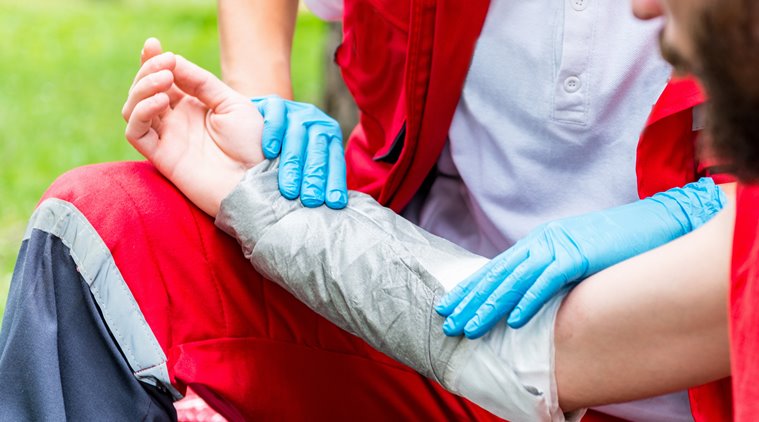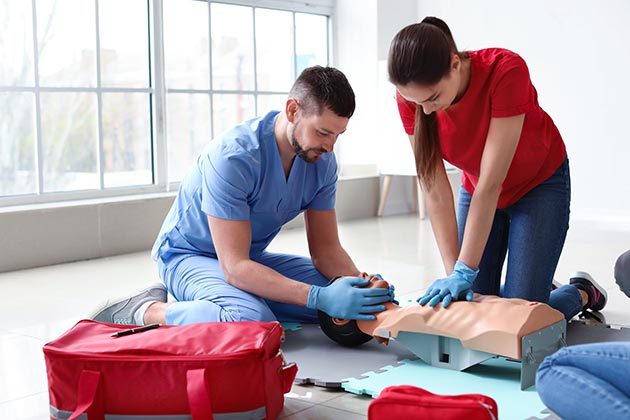Nine taboos for family first aid emergency treatment methods for daily dangerous situations
The family is a warm harbor, and various small accidents can happen at any time. How to accurately judge and implement first aid for the first time has become a knowledge we must master.
1. Avoid taking analgesics for acute abdominal pain: to avoid concealing the condition and delaying the diagnosis, you should go to the hospital as soon as possible.
2. Avoid resetting the internal organs immediately after the abdomen is injured: the internal organs must be thoroughly disinfected by a doctor before resetting. Prevent infection from causing serious consequences.
3. Avoid too long time for ligation with tourniquet: The tourniquet should be relaxed for 1 quarter of an hour every 1 hour, and records should be made to prevent ischemic necrosis of the distal limbs caused by the ligation of too-long limbs.
4. Do not lie on your back in comatose patients: they should lie on their side to prevent oral secretions and vomit from being sucked into the respiratory tract to cause suffocation. Not to give food or water to comatose patients.
5. Patients with cardiogenic asthma should avoid lying supine: lying supine will increase lung stasis and burden on the heart, making asthma worse and life-threatening. Should take the semi-recumbent position to make the lower limbs droop.
6. Patients with cerebral hemorrhage are not allowed to move at will: If there is a paralyzed person who suddenly falls into a coma or suffers from cerebral hemorrhage during the activity, it is likely to have a cerebral hemorrhage. Moving at random will make the bleeding more serious. You should lie on your back and raise your head. , Immediately sent to the hospital.
7. Avoid sloppy bandaging of small and deep wounds: If you are sloppy bandaging after being stabbed by a sharp object, the wound will become hypoxic and lead to the growth of anaerobic bacteria such as tetanus bacillus. The wound should be debrided and disinfected before bandaging and injection of tetanus antitoxin.
8. Patients with diarrhea should not take antidiarrheal drugs indiscriminately: Using antidiarrheal drugs indiscriminately before anti-inflammatory will make it difficult to discharge toxins and increase intestinal inflammation. Anti-diarrheal drugs, such as Imodium, should be used after the use of anti-inflammatory drugs such as furazolidone, berberine, norfloxacin.
9. People who get an electric shock should not be rescued by hand: cut off the power immediately after finding someone getting an electric shock, and use dry wooden sticks, bamboo yams, and other insulators to drain the wires immediately.
Emergency response
Nosebleed
Goal: stop bleeding; reduce blood backflow
1. Let the injured sit or stand, do not lie down, and tilt your head forward slightly.
2. Advise him to breathe through his mouth and pinch the nasal cartilage with a little force.
3. Ask him to spit out blood in his mouth, because swallowing blood may cause nausea and vomiting.
4. If you bleed a lot, you should be sent to the hospital for treatment immediately.
5. If there is a small amount of bleeding, relax the pressure after ten minutes, if it is still bleeding, press for another ten minutes. Don't let the injured raise his head for now.
6. If the bleeding still does not stop after 30 minutes, you should be sent to the hospital for treatment.
Electric shock
Goal: Get out of power; send to hospital as soon as possible.
1. Cut off the current quickly before touching the injured.
2. If the current cannot be cut off, use insulating objects such as bamboo, wood, or wooden chairs to separate the injured from the power source.
3. Check the condition of the injured. If the heartbeat and breathing stopped, cardiopulmonary resuscitation should be performed immediately.
4. Quickly notify the ambulance to be sent to the hospital for treatment.
Poisoning
Goal: Dilute the poison; send it to the hospital as soon as possible.
Mistake of drugs or chemicals
Symptoms: Vomiting, abdominal pain, cramps, confusion, coma, difficulty breathing, stains on the corners of the mouth.
1. If the injured person is awake and the accidentally ingested substance is determined to be corrosive, gastric lavage is prohibited, and he can be allowed to drink lubricants such as fresh milk or egg white to prevent absorption.
2. If the injured person loses consciousness, do not give him any food or drink to prevent food or liquid from flowing into the respiratory tract.
3. Take samples of toxic substances and vomit to the hospital to provide directions for further treatment.
4. If you have vomiting or diarrhea after twelve hours, still drink plenty of fluids and seek medical advice as soon as possible.
Gas or liquefied petroleum gas poisoning
1. Cover your mouth and nose with a handkerchief, or hold back your breath.
2. Open all doors and windows, do not switch electrical appliances or start a fire.
3. Turn off the gas supply.
4. Move the injured to a place with fresh air.
5. To inform the ambulance safely.
6. If the injured person stops breathing, artificial respiration should be performed immediately.
Disclaimer: and some pictures are from the Internet. If there is any infringement, please contact to delete!




Comments
Post a Comment